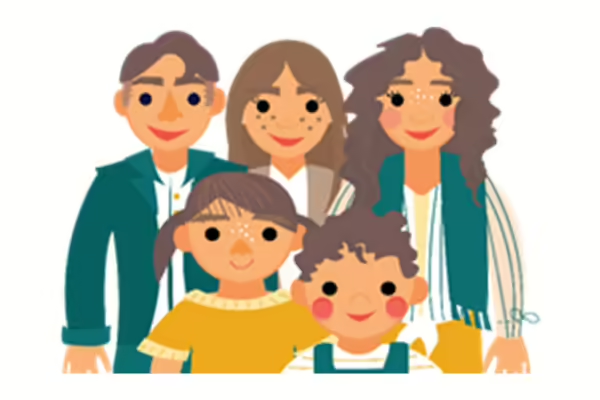
URBANA, Ill. — University of Illinois Extension, in collaboration with other institutions and partners, has published a research article on the benefits of Abriendo Caminos, a family-based intervention program that aims to reduce obesity among Hispanic children. The research title is “Randomized control trial of a childhood obesity prevention family-based Program: ‘Abriendo Caminos’ and Effects on BMI.” The article evaluates the effect of a family-based primary prevention intervention for childhood obesity in a community setting. The objective was to demonstrate that participation in the program could prevent excessive weight gain in children and prevent the development of obesity.
“The Abriendo Caminos program is culturally tailored and uses an integrated multi-component curriculum grounded in evidence-based information and theoretical frameworks,” says Margarita Teran, Illinois Extension assistant dean for integrated health disparities, and faculty of the Carle Illinois College of Medicine. “The curriculum was first created in Spanish and later translated into English. Expert revisions were made with input from stakeholders, considering literacy, regional resources, and cultural realities.”
This effort was made by a group of diverse stakeholders who brought their field expertise and cultural perspective.
The research also aimed to evaluate the impact of the Abriendo Caminos intervention on the BMI z-score outcomes of children and adolescents. The BMI-for-age percentile shows how a child's weight compares to other children of the same age and sex.
Chronic Metabolic Diseases
Chronic metabolic diseases, often called CMCs, such as obesity, diabetes, dyslipidemia, and hypertension, profoundly impact people of Hispanic descent. The prevention and treatment of these diseases are essential to improve their health and quality of life. Hispanics have a higher prevalence of CMCs than non-Hispanic whites. In addition to CMCs, physical inactivity and smoking are significant clinical risk factors associated with cardiovascular disease, the primary cause of death in the United States.
Hispanic children and adolescents are more likely to be obese or severely obese than non-Hispanic whites. Childhood obesity can lead to various health problems, including CMC and nonalcoholic fatty liver disease. Children's weight problems can become more severe as they enter school, make independent food choices, and engage in different physical activity levels. The development of primary and secondary prevention programs for childhood obesity is crucial.
Childhood Obesity Prevention Research
The Centers for Disease Control and Prevention has reported that Hispanic children are more susceptible to obesity and other long-term health issues:
- One in five children (19.7%) aged 2-19 in the US is affected by obesity.
- The rate increases to 26.2% among Hispanic children.
- Of children participating in Abriendo Caminos, only 45% had a healthy weight.
The 2021–2022 National Survey of Children’s Health reports that 34.7%, 32.4%, 34.5%, and 39.5% of children and adolescents (ages 10–17) from California, Illinois, Iowa, and Texas are affected by overweight or obesity. Furthermore, in California, Illinois, Iowa, and Texas, 44.3%, 49.2%, 43.2%, and 49.2% of Hispanic children and adolescents of the same age group are affected by overweight or obesity, underlying a health disparity.
Findings and Achievements
The problem of obesity is a major worry for young Hispanic individuals. This is made worse by structural and social barriers that limit their ability to access resources and services that promote long-term engagement in health-promoting activities. The key findings of this study are:
- The Abriendo Caminos program resulted in a higher incidence of weight loss than weight gain among children. Of the participants initially classified as obese, 11% reduced their BMI to the overweight category, while 15% of those who were overweight at the beginning of the program achieved a healthy weight.
- The program has resulted in a decrease in obesogenic eating behaviors among children and an improvement in the diet quality of mothers.
- Children have shown a reduced intake of fast food, French fries, and sugar-based beverages, while their consumption of vegetables has notably increased.
The accomplishments of Abriendo Caminos extend beyond mere statistics and publications. A young member who participated in the program with his family applied the knowledge gained to adopt a new routine of packing his lunch with additional fruits, vegetables, and water instead of soda, leading to substantial weight loss.
“My family of six now consumes less sweetened beverages. We used to drink lots of soda daily, but now we only buy one six-pack a week, and each of us only gets one soda a week,” says a program participant. “I also noticed that my family became more physically active. This program is a good example of how using evidence-based and culturally adapted methods can positively impact healthy behaviors.'
Challenges of the Research
The COVID-19 pandemic posed a difficulty in conducting the intervention study in person. Originally, 500 families, 250 in the intervention group and 250 in the control group were to be included to detect the effects of the intervention. However, due to the pandemic, the research was interrupted. Only data from 426 participants who attended the face-to-face workshops were reported. Other natural disasters, such as an earthquake and three hurricanes (Harvey, Maria, and Irma), delayed data collection in Texas and Puerto Rico. Despite the challenges and small sample size, it was possible to show the impact of Abriendo Caminos.
Illinois Extension’s Integrated Health Disparities Team
Illinois Extension's Integrated Health Disparities Team provides leadership and resources in the crusade to address health inequities. Their resources and public engagements focus on health promotion, education, healthcare access, behavioral health, and community well-being. For more information, visit go.illinois.edu/IHD.
SOURCE: Margarita Teran, Extension Assistant Dean for Integrated Health Disparities Programs
WRITER: Herbert Chavez, Media Communications Coordinator, Illinois Extension
Illinois Extension leads public outreach for University of Illinois by translating research into action plans that allow Illinois families, businesses, and community leaders to solve problems, make informed decisions, and adapt to changes and opportunities. Illinois Extension is part of the University of Illinois Urbana-Champaign College of Agricultural, Consumer and Environmental Sciences.